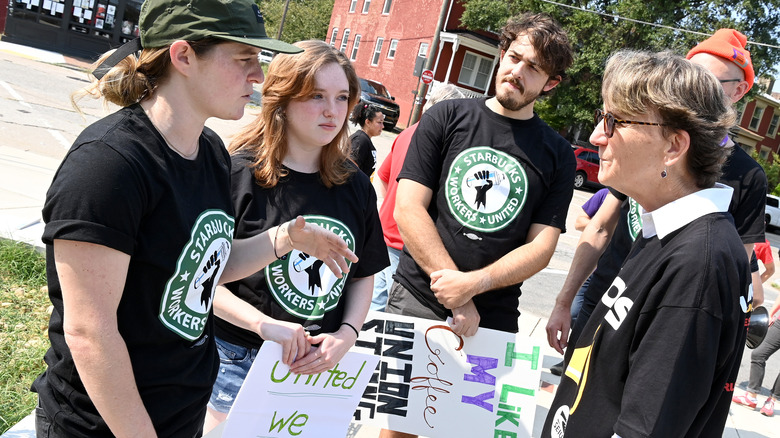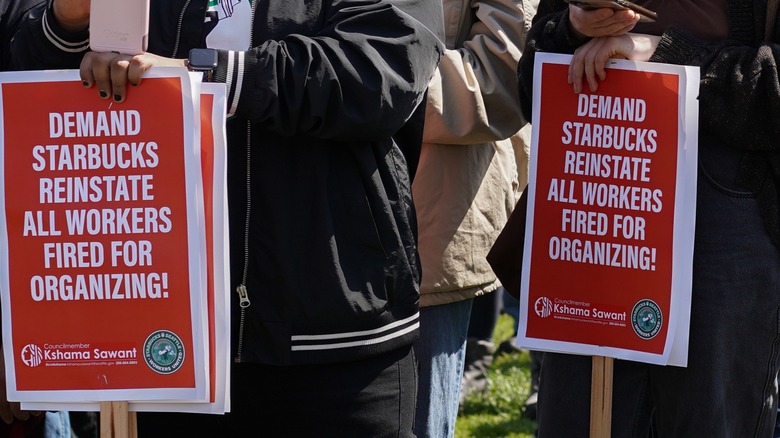Why The Worsening Economy Could Impact Starbucks' Union Efforts
It's been an eventful year for everybody — but for Starbucks, the past month alone has been particularly eventful. Its fall menu has only recently hit, but Starbucks has already sold more pumpkin spice lattes this season than ever before, per Restaurant Business. But, the most notable recent events for the coffee giant have nothing to do with its seasonal offerings. Earlier this week, in a huge stride for the workers' movement, Starbucks announced that it was finally ready to begin union contract negotiations. The company agreed to a three-week bargaining period with all 238 thus-far unionized stores nationwide starting in October, per CNBC. Last week, Starbucks Workers United celebrated a massive win via Twitter when the first Starbucks location in Houston, Texas, won its union election. Just a few days before the Houston election, the longest-running strike in Starbucks history came to a victorious conclusion for pro-union employees after 64 consecutive days of picketing (via Boston.com).
But, the latest push in this unionization saga isn't coming from the coffee company or its employees: It's coming from external forces. Here's why the worsening economy could impact Starbucks' union efforts.
Recession means less job security
Financial analysts predict that the U.S. could fall into a recession in 2023, and if it does, pro-union baristas nationwide could lose some of their footings. Catherine Creighton, director of Cornell University's Industrial and Labor Relations Buffalo branch, notes that if unionizing workers are fired by retaliating employers, it's more difficult for them to find other work in a recession, via CNBC. Starbucks indeed has a track record of terminating vocal pro-union employees — and has been sued for it more than once. But, California Starbucks barista trainer Tyler Keeling says it's worth the risk. "People are seeing that Starbucks is willing to kind of mess with their livelihood to prevent this union, and that scares people," admits Keeling. "But at the end of the day, as far as it is driving people not to organize, it's also driving people to organize,"
Still, in December 2021, when the first Starbucks store ever won its union election in Buffalo, NY (per New York Post), the country's economic landscape looked considerably different. This month, inflation hit a record-high 10% in the Eurozone, says The New York Times. Inflation in the U.S. hit its 40-year high back in July 2022, a whopping 9.1% per PBS. Now, even though U.S. consumers are watching domestic inflation inch back down with cautious optimism, a potential recession could still be bad news for union baristas.
How recessions impact labor unions
In 2021, when employees transitioned into the post-pandemic world, a workers-rights movement emerged across the service industry. Now, as employers have to increasingly incentivize their employees to stick around, many restaurants are still struggling to stay staffed. Illinois Restaurant Association chairman Sam Sanchez says the cost of labor has increased by 30%, per WTTW. While this may seem like a win for laborers, it might have different implications during an economic recession.
A 2017 study published in RSF Journal analyzed the impact of various historical recessions on the U.S. labor movement and found that recessions consistently have a "negative impact" on both the functionality and public approval of unions. Similarly, in a 1984 study, University of Pittsburgh professor James Craft concluded, "In recession[s], the unions have been suffering substantially in terms of their bargaining power," via UPI. Creighton, on the other hand, thinks there's still some time before current and would-be Starbucks union employees have to worry. "I don't see that we are in that position at this point," Creighton says, via CNBC, "because employers are still having a really hard time filling jobs, the baby boomers have retired and all evidence points to the fact that the labor market is going to be favorable to employees in the near future,"


